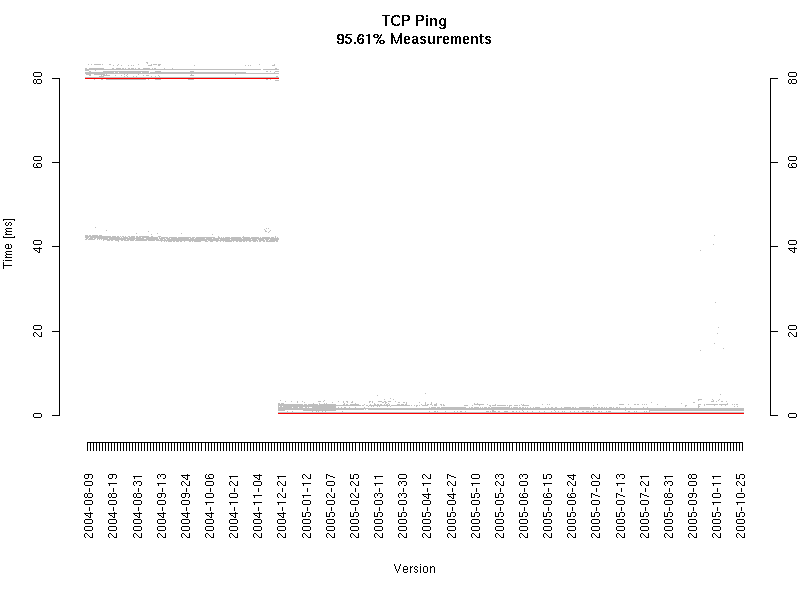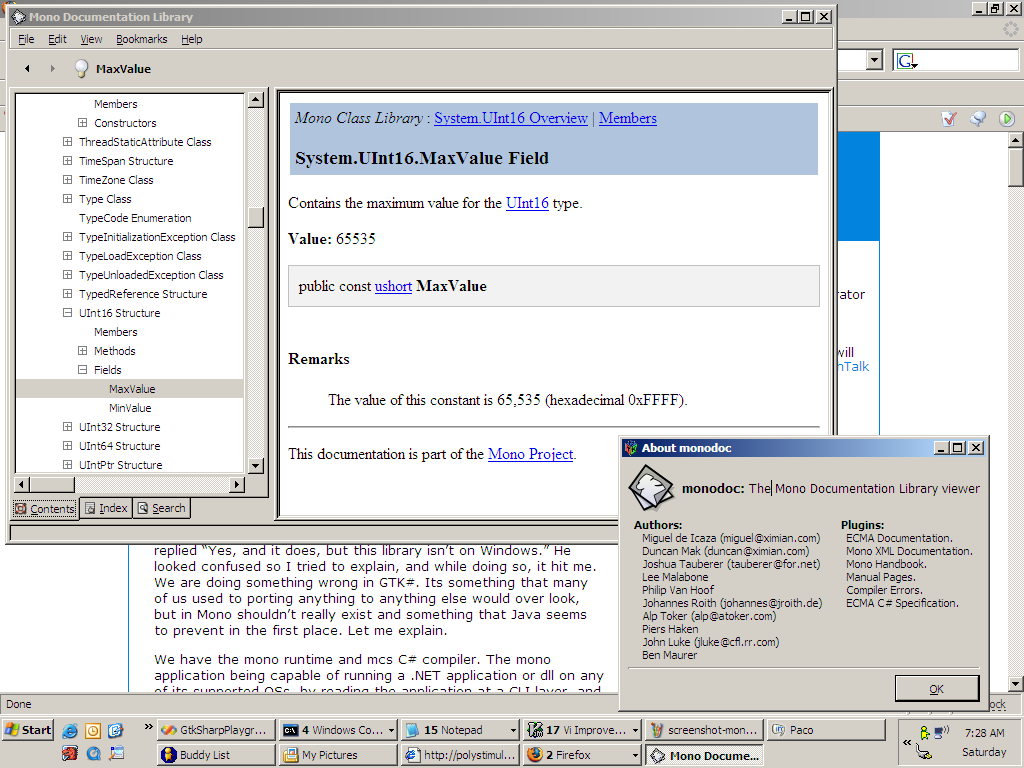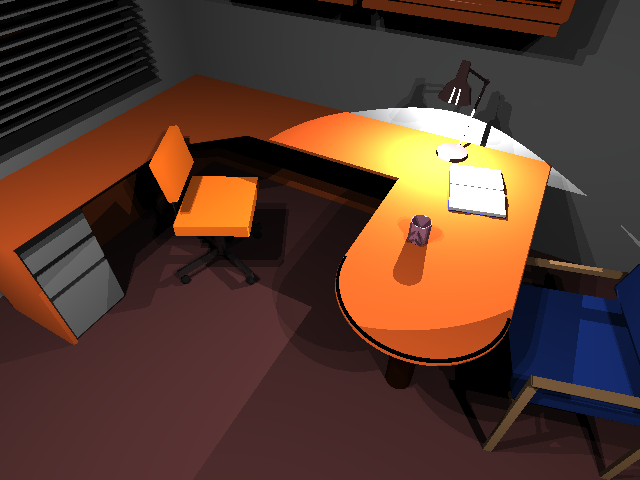Recent Novell Open Source Hires
 Novell just hired Niels
Bornstein, the co-author of Mono: A
Developer's Notebook. The O'Reilly best-seller. Niel
will be working on the Linux and Open Source practice group.
Novell just hired Niels
Bornstein, the co-author of Mono: A
Developer's Notebook. The O'Reilly best-seller. Niel
will be working on the Linux and Open Source practice group.
Also Tor Lilqvist, the developers who brought GIMP and Gtk+ to Windows has been hired to work full time on Gtk+ on Windows and to assist us porting various Gtk+ based applications to Windows. Nat's blog has more details.
Tor will initially be helping Frederik port our new Desktop Search tool Beagle to Windows:

Later he will take on the final step to make the world a safer place: bring Evolution (our email and calendar client) to Windows. Even Windows users deserve an email program instead of a petri dish of worms and viruses.
David Reveman one of two developers behind Glitz also joined Novell. He will be working full-time on completing and tuning Glitz as well as contributing to the Cairo imaging library (the framework that will become the foundation for most open source projects to do graphics rendering).
Glitz brings OpenGL-based acceleration to Cairo rendering (Cairo is Mono's substrate for implementing the System.Drawing namespace). Screenshots of Glitz rendering are availble here.
 And finally Robert O'Callahan has
joined the Novell desktop team to work full time on various
Mozilla improvements. Robert is working on some pretty
exciting things: Multi-column layout for web pages, improving
Mozilla's SVG support and continuing Mike Shaver's work on
MonoConnect.
And finally Robert O'Callahan has
joined the Novell desktop team to work full time on various
Mozilla improvements. Robert is working on some pretty
exciting things: Multi-column layout for web pages, improving
Mozilla's SVG support and continuing Mike Shaver's work on
MonoConnect.
Commondreams favorites
A few of my favorite articles from CommonDreams in the last few days:
- Robert Fisk: Fear and Voting in Baghdad.
- Robert Fisk: 'Hotel Journalism' Leaving Big Holes in Reporting About Iraq. Specially interesting after reading "Pity the Nation" when Robert describes the environment in which journalists were covering Israel's invasion of Lebanon from the "Commodore" hotel in Beirut never leaving the facilities to report live.
- Molly Ivins: Leading by Misleading.
- Greg Palast: CBS' Cowardice and Conflicts Behind Purge. An interesting article from investigative journalist on the scapegoats of the recent CBS fiasco.
- David Corn: WMD Hunt Ends, Bush's Spin Goes On (also related: Star Tribune Editorial
- Michael Brown: Palestinian Elections: Voting is Good. Freedom is Better.
- Noam Chomsky interview: on the solution to the Palestinian conflict.
Mono News
Tracking Performance: Tomas's team in Charles University has published the results from speed benchmarking on Mono to track potential performance regressions. On the graph you can clearly see Lluis' fix to the remoting channels (the large drop in the Tcp tests). These have caused quite a lot of excitement in the Mono team:

Following up on Zac's port of Gecko# to Windows (which is now used in the Windows Beagle port), we now have patches to run Monodoc with Gecko# instead of GtkHTML.

By Mono 1.2 I want to switch Monodoc to use Gecko, to let us use CSS instead of tables in our documentation rendering.
Mono Windows.Forms implementation is rapidly advancing, it is now capable of running Winforms NPlot, as opposed to my Gtk# port:

The Windows.Forms team has started a blog to track the major developments, it is available here.
DotRay: A ray tracer written in C# for .NET and Mono was recently announced. It will become a nice test for the performance tuning going into Mono (Mono's Arrays Bounds Check Elimination code was recently updated to eliminate some checks it was missing and the AMD64 bit port has support for the SSE instructions set, which we are going to backport to the x86 backend):

In the last couple of days people have been using Ben Maurer's Mono heap profiler:

Various improvements have been based on the tool: from System.XML memory reduction (1.5 megabytes shaved with a relatively small patch when loading a 25 megabyte file) to improvements to F-Spot memory usage.
Paolo also did some micro-tuning for P/Invoke hungry libraries; It shaved about 50k-60k of memory for Gtk# based applications on startup.
F-Spot also went through some performance tuning optimizations: Larry greatly improved the rendering speed when switching pictures and in particular when rotating photographies (F-Spot automatically rotates pictures based on the EXIF metadata of the image).
Robert Love's new Linux Kernel Book
Robert Love (here shown in his natural habitat) just got the second edition of his book "Linux Kernel Development" published. It now comes with a cute Novell cover. Get your copy today.
Companion to Pity the Nation
I keep churning through Chomsky's Fateful Triangle book (he now has a blog!)
Partly the book is a good complement to "Pity the Nation". Pity the Nation tells the story from Robert Fisk's standpoint a journalist in Beirut that covers the events on a daily basis. Chomsky's book on the other hand breaks up the various elements of the civil war by topic, so the actors and events are easier to identify in his book. Chomky's book lacks the sense of a story that Pity the Nation has though.
OH MY GOD OH MY GOD OH MY GOD OH MY GOD OH MY GOD
Keith Packard has a Blog. And I love it!
Posted on 19 Jan 2005
Blog Search
Archive
- 2024
Apr Jun - 2020
Mar Aug Sep - 2018
Jan Feb Apr May Dec - 2016
Jan Feb Jul Sep - 2014
Jan Apr May Jul Aug Sep Oct Nov Dec - 2012
Feb Mar Apr Aug Sep Oct Nov - 2010
Jan Feb Mar Apr May Jun Jul Aug Sep Oct Nov Dec - 2008
Jan Feb Mar Apr May Jun Jul Aug Sep Oct Nov Dec - 2006
Jan Feb Mar Apr May Jun Jul Aug Sep Oct Nov Dec - 2004
Jan Feb Mar Apr May Jun Jul Aug Sep Oct Nov Dec - 2002
Jan Feb Mar Apr May Jun Jul Aug Sep Oct Dec
- 2022
Apr - 2019
Mar Apr - 2017
Jan Nov Dec - 2015
Jan Jul Aug Sep Oct Dec - 2013
Feb Mar Apr Jun Aug Oct - 2011
Jan Feb Mar Apr May Jun Jul Aug Sep Oct Nov Dec - 2009
Jan Feb Mar Apr May Jun Jul Aug Sep Oct Nov Dec - 2007
Jan Feb Mar Apr May Jun Jul Aug Sep Oct Nov Dec - 2005
Jan Feb Mar Apr May Jun Jul Aug Sep Oct Nov Dec - 2003
Jan Feb Mar Apr Jun Jul Aug Sep Oct Nov Dec - 2001
Apr May Jun Jul Aug Sep Oct Nov Dec